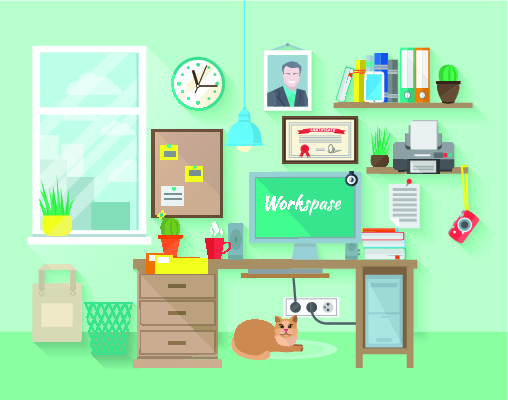
Text: Gaby Hamm-Brink, Gabriele Strasser
For some, working from home is the ideal form of work, especially if childcare or caring for a relative can be reconciled with the job. While teleworking is at least partially standard in some companies, other employers are still very hesitant when it comes to this topic. It is clear that working from home has a number of advantages - starting with avoiding traffic jams in the morning. But teleworking also has its pitfalls.
Not all employers are receptive to the desire for flexible working locations. While there is now a legal right to work from home in the Netherlands, in Germany it depends on the goodwill of the employer. And there are also companies that are reversing their once liberal practice. When Yahoo boss Marissa Mayer categorically banned her employees from teleworking when she took office in 2013, it made big waves. Her reasoning:
"Communication and collaboration are important, so we need to work side by side"
What exactly drove the Yahoo boss was the subject of much speculation in the media. What is clear, however, is that prejudices against working away from the office persist: one phenomenon that employers particularly fear in connection with working from home is procrastination. The writer and newspaper author Harald Martenstein has aptly summarized this phenomenon: "When I have to write, I make a point of starting at a certain time. When that time comes, usually around nine or ten, and I'm not in the office, I start cleaning the kitchen. Then I check my emails. Then I go shopping and tidy up". Employers are therefore afraid that their employees will fall prey to procrastination and spend most of their time on private trivialities.
Better performance in the home office
But what about the effects on the home workers themselves? According to a lot of research, working at home is considered more productive because there are no interruptions or disturbing background noise. Those who work in the privacy of their own four walls are generally able to focus better than those who are exposed to constant background noise in an open-plan office; there is no need for a quick chat with colleagues and there is a high probability that a few emails will be dealt with quickly in the evening if it serves the "clean desk principle". However, all of this also harbors the risk of self-exploitation: the boundaries between work and private life become even more blurred in the home office than they already are. For example, it was found that home workers generally take shorter breaks than their colleagues in the office, and the feeling of having achieved something is not as natural as for someone who already has the impression of having made an active contribution through their presence in the office.
Less visibility is bad for your career
Despite all the productivity that apparently speaks in favor of working at home, statistically speaking it appears to be a career barrier. According to organizational researcher Dan Cable, home workers are less likely to be promoted than their colleagues because they don't just bump into the boss and can report on the latest project progress. Time "spent" in the office still seems to be more beneficial to careers than concentrated work at home. And this despite the fact that we have long since arrived in the digital age.
What matters: inner independence and self-motivation
The list of Tips and tricks for organizing teleworking in the home office is colourful and diverse, but it is primarily fed by structural content such as time management, organizational processes and rituals built into everyday working life. At its core, however, it is about a completely different question. And that is: Which COMMUNICATION TYPE am I? Do I only get going when my boss and colleagues encourage me to, or can I draw motivation and drive from myself? Am I a person who can recognize myself for what I have achieved or do I need a sounding board for my work results, a stage that makes them resonate?

The less dependent I am on exchanges, immediate feedback and external confirmation, the better I am able to draw on myself and apply the unquestionable discipline that working within my own four walls requires. After all, the temptation to "procrastinate" is huge in the face of mountains of laundry in the bathroom, fluffy carpets in the living room or the neighbor's whimsical call for a quick round of espresso.
However, once the conditions of inner independence from exchange and quick feedback have been met, procrastination behaves to teleworking a bit like the inner bastard to sport: once I have listened to the enthusiastic feedback loops of my muscular body, they will always be an incentive for me to keep myself elastic in the unstoppable process of weathering.
These feedback loops will of course be of a different nature in the home office and will be more on the mental level of results and self-satisfaction. There is no question that clear time management and the odd cup of tea can also be helpful.
Is the home office still lacking acceptance?
According to a 2014 study by the German Economic Institute (DWI), highly qualified employees such as managers, scientists, lawyers, journalists, engineers and teachers are particularly likely to work from home. Those who work from home usually have a university degree or are self-employed. If children live at home, the father or mother works from home slightly more often - the decisive factor here is whether the respective profession lends itself to working from home. The use of the home office reached its peak in Germany in 2000. From 2008, the figures fell steadily by a total of around 800,000 and leveled off at five million in 2012 - that is around 12 percent of all employees. In a European comparison, Germany is in the lower midfield. Working from home is much more widespread in the Scandinavian countries, France, the UK and Central European countries such as Switzerland, Austria, Belgium and Luxembourg. According to the DWI, the reasons for this could be better working conditions for working from home and greater acceptance on the part of employers and employees.
Source: DWI Weekly Report 8/2014
You may also be interested in these articles:
7 tips on how to work productively from home
More family-friendliness through digital change?

